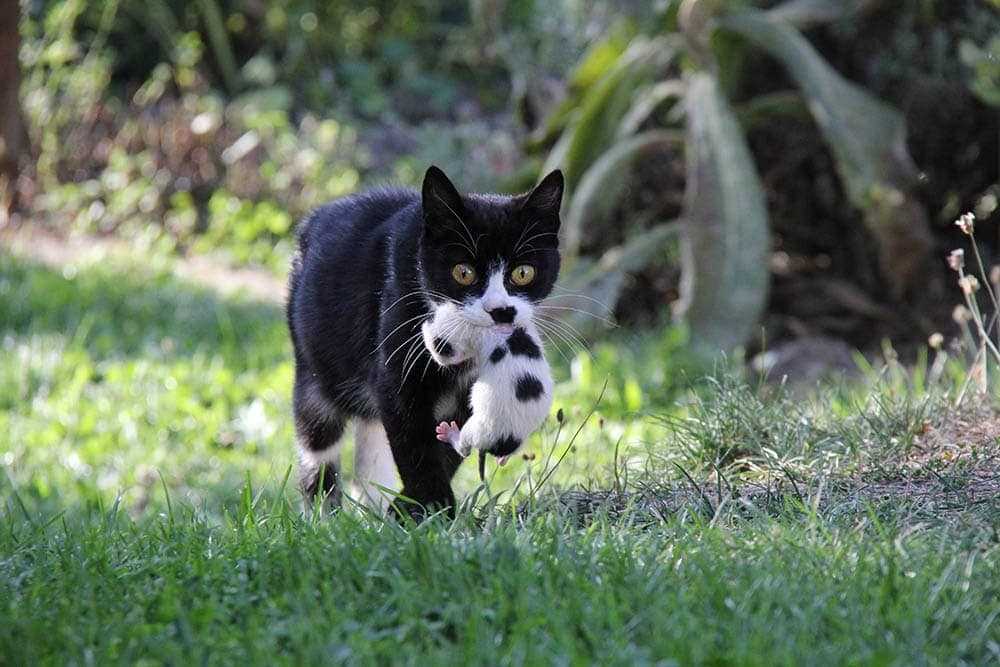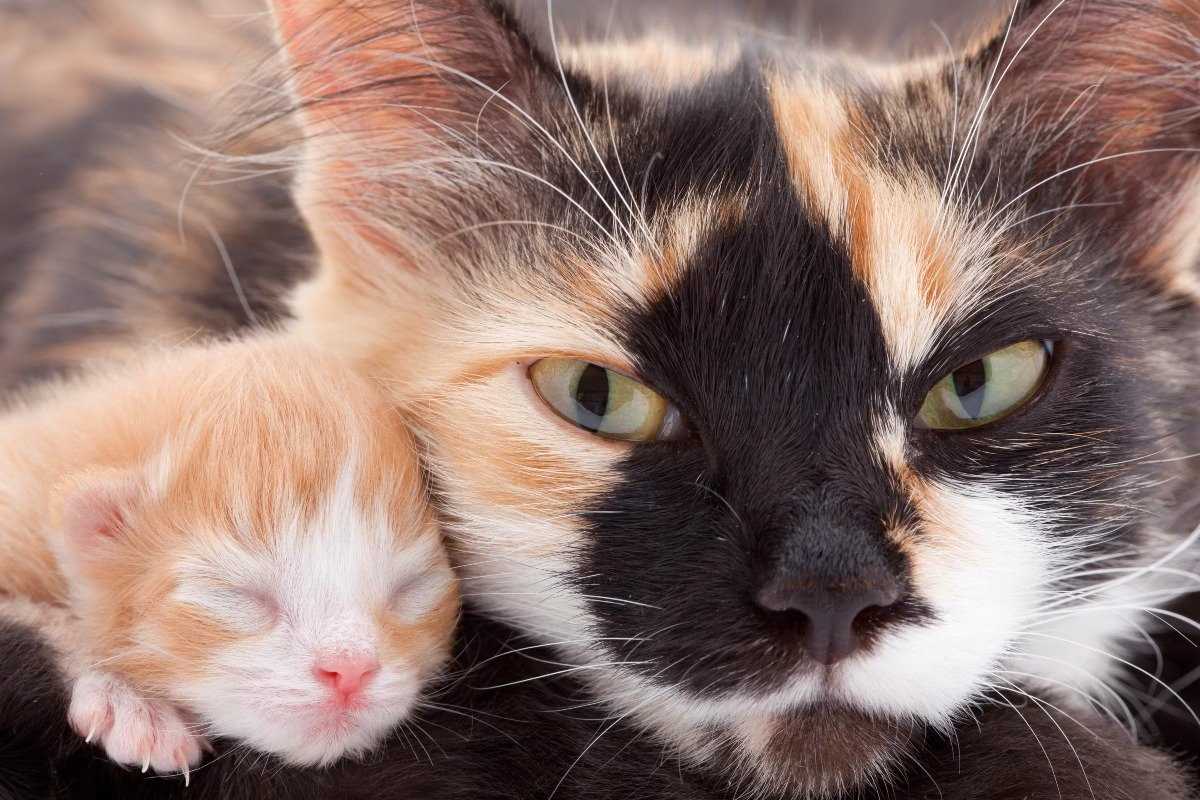



When a feline consumes its offspring, it often stems from instinctual responses shaped by survival needs. Stress, inadequate resources, or health complications can trigger this alarming action. It’s crucial for caregivers to ensure a nurturing environment, providing ample food, shelter, and emotional support during the crucial stages of motherhood.
In situations where the health of the mother is compromised, she may resort to this behavior to prioritize her own survival. Stressors such as overcrowding or threats from predators can exacerbate this instinct. Observing the well-being of both the mother and her young is vital; a calm, safe space can significantly reduce anxiety levels.
Additionally, certain genetic factors can influence a mother’s behavior. If she has experienced trauma or lacks maternal instincts, the likelihood of such actions increases. Monitoring interactions between the mother and her young is essential; any signs of distress should be addressed immediately to prevent potential harm.
Being proactive, such as providing veterinary care and creating a serene environment, can mitigate risks. It’s a complex issue that requires awareness and understanding of the emotional and physical needs of a mother during this delicate time.
Unusual Maternal Behavior
Occasionally, a mother feline may consume her offspring due to distress or perceived threats. If she senses danger, instinct may drive her to eliminate the evidence of her young. This behavior can also be linked to early life stressors or trauma.
Nutrition plays a significant role in this phenomenon. If the mother lacks essential nutrients or is malnourished, she might resort to cannibalism as a means of survival, consuming her own litter for sustenance.
Health issues can cause maternal neglect. If a female is ill or suffering from complications, she might abandon or harm her offspring. Monitoring her condition is essential; veterinarian intervention may be necessary to ensure both her health and that of her young.
Genetic factors may also influence these actions. Some inherited traits can lead to abnormal maternal instincts, resulting in harmful behavior towards the young. Understanding lineage can provide insights into potential risks.
Lastly, environmental factors can impact behavior. Stressful surroundings, lack of privacy, or overcrowding can lead to anxiety and irrational actions. Creating a calm and safe space is crucial for a healthy maternal experience.
Understanding Maternal Instincts in Felines
To truly grasp the behaviors of mothers in our species, observing their environment and circumstances is key. Stressors such as inadequate nutrition, illness, or environmental threats can trigger instinctive reactions that may seem harsh but are rooted in survival. A mother may prioritize her well-being or that of her remaining offspring over additional young ones.
It’s essential to recognize the role of hormonal changes during pregnancy and after delivery. These fluctuations can influence behavior significantly. A mother may act unpredictably, particularly if she feels overwhelmed or vulnerable. Ensuring a calming and secure space can mitigate these responses.
Also, genetics play a pivotal role. Some individuals may have inherited traits that affect maternal behavior. Observing lineage and past maternal behaviors can provide insights into potential outcomes for new mothers.
Providing a quiet, safe area for new arrivals can enhance maternal instincts. Reducing disturbances from other pets or human activity fosters a more nurturing environment. It’s beneficial to monitor interactions closely during this sensitive period.
Finally, education on proper care and support for mothers can significantly influence outcomes. Resources that promote understanding of feline behavior can empower owners to create the best conditions for nurturing and protecting the new generation.
Factors Leading to Offspring Consumption
Stress levels significantly influence maternal behavior. High anxiety can cause a mother to reject or harm her young. Environmental factors, such as noise or the presence of predators, can contribute to this stress.
- Health issues play a critical role. If a mother is unwell, she may not recognize her offspring or may feel unable to care for them properly.
- Malnutrition impacts a mother’s instincts. Insufficient nutrients can lead to a lack of energy, making her less attentive to her litter.
- Genetic predisposition can also be a factor. Certain breeds may have higher tendencies towards unusual maternal behaviors.
Another consideration is the size of the litter. A large number of young can overwhelm a mother, leading to neglect or harmful actions towards weaker offspring.
In rare cases, if a mother perceives a kitten as sick or weak, she might eliminate it to protect the health of the remaining young. This survival instinct is rooted in natural selection.
Providing a safe and comfortable environment, such as a cat tower for large cats, can help reduce stress and encourage healthy maternal behavior.
The Role of Stress and Environmental Conditions

Stress factors and environmental issues can significantly impact feline behavior and maternal instincts. High levels of anxiety may trigger unusual reactions, including the rejection or consumption of offspring. Here are key aspects to consider:
- Living Conditions: Overcrowded spaces or a lack of privacy can cause distress. A quiet, secure area is crucial for a mother to feel safe while nursing her young.
- Noise Levels: Loud environments, such as those with frequent human activity or other animals, can elevate stress. It’s essential to create a calm atmosphere for nurturing.
- Health Issues: Illness or nutritional deficiencies can lead to erratic behaviors. Ensuring proper health care and a balanced diet is vital for both mother and her offspring.
- Social Dynamics: Interaction with other pets or humans can influence behavior. A harmonious environment reduces anxiety and promotes maternal care.
- Previous Experiences: If a mother has faced trauma or loss in the past, she may react differently to new litters. Understanding her history can help in providing appropriate support.
Addressing these factors can mitigate stress and enhance maternal instincts. If a mother seems overwhelmed, consider creating a safe haven for her and her babies. Resources like the best small air compressor for nail gun can help manage noise levels during renovations or repairs, contributing to a serene environment.
Health Issues Affecting Maternal Behavior
Stress and health problems can lead to significant changes in nurturing actions. Conditions such as infections, hormonal imbalances, or nutritional deficiencies may negatively impact a mother’s ability to care for her offspring.
Some specific health issues include:
| Health Issue | Impact on Maternal Behavior |
|---|---|
| Infections (e.g., mastitis) | Can cause pain, leading to withdrawal from caring for young. |
| Nutritional Deficiencies | May result in reduced milk production, affecting the health of the young. |
| Hormonal Imbalances | Can disrupt maternal instincts and bonding. |
| Chronic Pain or Illness | May cause lethargy, impacting engagement with offspring. |
Regular veterinary check-ups are essential to detect and address any underlying health issues. A balanced diet and proper nutrition can help maintain overall health, supporting maternal instincts. Observing behavior changes can provide early indications of health problems, allowing for timely intervention.
Behavioral Patterns in Feline Reproduction
Understanding the reproductive behaviors of felines reveals much about their instinctual patterns. During pregnancy, a mother often demonstrates heightened nurturing behaviors, including meticulous grooming and protective actions. This nurturing phase is critical for the survival of the young.
Research indicates that maternal behavior can vary significantly among breeds and individual personalities. For instance, some may exhibit strong attachment to their offspring, while others may show indifference. Factors such as genetics and early life experiences play a role in shaping these behaviors.
During birthing, the mother typically seeks a secluded and safe environment. This instinct prevents potential threats from disturbing the vulnerable newborns. Interestingly, mothers may also engage in behaviors that appear contradictory, such as consuming a stillborn. This action, while distressing, can be an instinctual response to eliminate potential dangers and maintain a clean den.
Observation of interactions between the mother and her young reveals a complex communication system. Vocalizations, body language, and scent marking are integral in establishing bonds. Kittens learn critical survival skills through play and imitation, guided by their mother’s demonstrations.
Environmental factors can significantly influence maternal behaviors. A stable and secure setting promotes positive interactions, while high-stress environments may lead to erratic behaviors. Ensuring a calm atmosphere during birthing and early development stages is beneficial for both the mother and her young.
Health status also directly impacts maternal instincts. Illness or nutritional deficiencies can compromise a mother’s ability to care for her offspring adequately. Regular veterinary check-ups and a balanced diet are essential for maintaining the well-being of the mother, which in turn supports her nurturing capabilities.
Preventive Measures for Cat Owners
Provide a calm and secure environment for the queen and her litter. Minimize loud noises and sudden movements around her space to reduce anxiety levels.
Regular veterinary check-ups are essential. Monitor health conditions that could affect maternal behavior. Discuss any concerns with a veterinarian promptly to ensure optimal care.
Nutrition Matters

Nutrition plays a significant role in a mother’s ability to care for her young. Offer a balanced diet rich in essential nutrients to support her health during and after pregnancy. High-quality kitten food is often recommended during nursing.
Socialization and Interaction
Encourage gentle interaction with the mother. Spend time observing her with her offspring, ensuring she feels comfortable and secure. Avoid excessive handling of the kittens to allow the mother to establish her bond without stress.
Consider spaying as a long-term solution to prevent unwanted litters. This can help avoid the complexities and challenges of managing a new family of felines.








